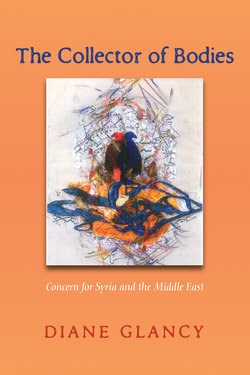Читать книгу The Collector of Bodies - Diane Glancy - Страница 5
На сайте Литреса книга снята с продажи.
Notebook of a Trip
ОглавлениеOver a ten-day spring break, between the two wars of the two Bush administrations, I went to Syria and Jordan as an Arts America speaker for the United States Information Agency, when it was still in operation. I gave readings and lectured about Native American culture. I answered questions about America. They asked about the violence. Was I afraid to leave my house?
I remember stopping at the airport in Athens, Greece, where armed soldiers boarded the plane to search it. I remember landing in Cairo, taking off again, seeing a pyramid like a thimble on the barren land. I remember the square in Damascus where the driver pointed, that’s where they hold public executions.
In Syria, I visited Aleppo University, the University of Damascus, Tishrin University in Lattakia, and Ba’th University in Homs, sometimes traveling a hundred miles between cities in an American Embassy van with a US cultural attaché, a visiting Fulbright fellow and the Syrian driver. In Jordan, I visited the Jordan Writer’s Union, the Arab Writer’s Union, Al Isra University in Amman, the Jordan University for Women, and various other groups.
Afterwards, the trip settled like an encampment on a hill. Maybe the trip was more intense because I was on land that connected to Christianity. The trip uncovered thoughts that had been pushed down by an academic setting. I heard, we’re people of the book—Jews, Christians, Muslims, from the Muslims more than once. I was asked to explain Christianity—How it meant different things to different people. But for me, it meant salvation through faith in the death and resurrection of Christ.
Maybe the trip was more intense because Syria was the first time I was in a van stopped at check points by armed soldiers along the highway. Maybe it was because standing at the ruins of Ebla in Syria, there was an older old than any of the history I knew in America.
I wanted to make use of the disconnected sights jotted down during travel, the stops and intrusions, the interrupted fragments, the unrest of students in the universities I visited. I don’t want to be told what to believe, they said. I heard their lack of possibility, their frustration, their anger.
I wanted to connect the Syria and Jordan trip to my other travels that semester, not always in chronological order. I wanted to work with the way memory works when there isn’t time to order events. I wanted to convey the sense of hurry before I left—the papers to grade, a small roll-on bag to pack, a visiting writer who would not come to the door of the hotel when I picked her up the days and evenings before I left, but made me park and come in for her and wait.
What did I find on the USIA trip, but a glimpse of something I was a stranger to?—a subtle and diminutive shock wave, a silent yet definite detonation somewhere in the neighborhood—the clearing of smoke afterwards—the rubble. I wanted to record the quick look into a volatile place because it was all I was offered—and to leave with a sense that our words were something like tissue paper held over an open flame.
